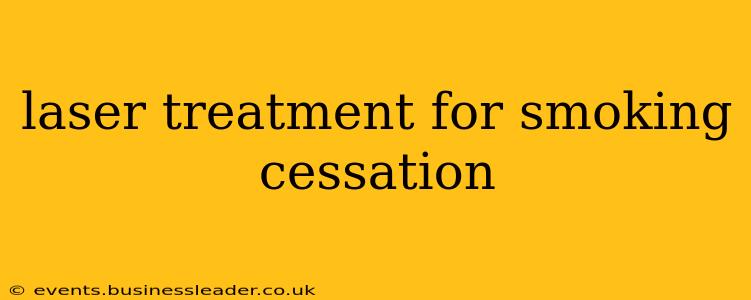Quitting smoking is a monumental challenge for many, and the search for effective cessation methods is constant. While nicotine replacement therapy and counseling remain cornerstones of smoking cessation, a newer approach is gaining attention: laser treatment. This article explores the potential benefits, limitations, and scientific evidence behind laser treatment for smoking cessation.
What is Laser Treatment for Smoking Cessation?
Laser treatment for smoking cessation, often referred to as low-level laser therapy (LLLT) or photobiomodulation, involves the use of low-intensity lasers targeted at specific acupuncture points believed to influence nicotine cravings and withdrawal symptoms. The theory is that the laser stimulation modulates the activity of the nervous system, reducing cravings and making the quitting process easier. It's important to note that this is not the same as laser surgery and is a non-invasive procedure.
How Does Laser Treatment Work?
The exact mechanisms by which laser treatment might aid in smoking cessation are not fully understood, but several hypotheses exist. One theory suggests that the laser stimulation influences the release of endorphins, which have mood-boosting effects and can help manage withdrawal symptoms like irritability and anxiety. Another proposes that the treatment impacts the release of neurotransmitters involved in reward pathways, potentially reducing the brain's craving for nicotine. More research is needed to definitively determine the mechanisms at play.
Does Laser Treatment Really Work? What is the Scientific Evidence?
The scientific evidence supporting the efficacy of laser treatment for smoking cessation is still limited and somewhat conflicting. While some small studies have shown promising results in terms of reduced cravings and improved quit rates, larger, more rigorous clinical trials are necessary to confirm these findings. The results often vary depending on the laser parameters used (wavelength, power, and treatment duration), the specific acupuncture points targeted, and the overall study design. Currently, laser treatment is not considered a first-line treatment for smoking cessation by major health organizations.
What are the side effects of laser treatment for smoking cessation?
Generally, laser treatment for smoking cessation is considered a safe procedure with minimal side effects. Some individuals may experience mild temporary redness or slight discomfort at the treatment site. However, these side effects are typically mild and resolve quickly. It's crucial to consult with a qualified healthcare professional to discuss any potential risks or contraindications.
How much does laser treatment for smoking cessation cost?
The cost of laser treatment for smoking cessation can vary depending on several factors, including the location of the clinic, the number of sessions required, and the specific laser technology used. It's best to contact clinics offering this treatment for precise pricing information.
Is laser treatment for smoking cessation covered by insurance?
Insurance coverage for laser treatment for smoking cessation varies widely depending on the insurer and the specific policy. Some insurance companies may cover it if deemed medically necessary, while others may not. It is essential to contact your insurance provider directly to determine your coverage.
Is laser treatment for smoking cessation effective without other cessation methods?
While laser treatment may offer some benefits, it's generally considered most effective when combined with other proven smoking cessation methods such as counseling, nicotine replacement therapy, or behavioral modification programs. A comprehensive approach often yields the best results.
What are the alternatives to laser treatment for smoking cessation?
Numerous effective alternatives exist for smoking cessation, including nicotine replacement therapy (patches, gum, lozenges), medications like bupropion and varenicline, and behavioral therapies like cognitive behavioral therapy (CBT). Choosing the best approach depends on individual needs and preferences. A healthcare professional can help determine the most suitable option.
Conclusion
Laser treatment for smoking cessation presents an intriguing approach, but more research is needed to definitively establish its efficacy and optimal application. While some studies suggest potential benefits, it's crucial to view it as a supplementary therapy rather than a standalone solution. Combining laser treatment with other evidence-based methods may offer a more comprehensive and effective strategy for individuals seeking to quit smoking. Always consult with a healthcare professional to discuss the best course of action for your specific circumstances. They can help you weigh the potential benefits and risks of laser treatment alongside other proven cessation strategies.
